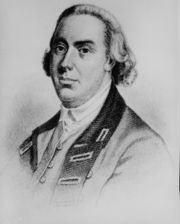[to His Excellency General Gage]
“Cambridge, April 20, 1775.
Sir, – The unhappy situation into which this colony is thrown gives the greatest uneasiness to every man who regards the welfare of the empire, or feels for the distresses of his fellow-men: but even now much may be done to alleviate those misfortunes which cannot be entirely remedied; and I think it of the utmost importance to us, that our conduct be such as that the contending parties may entirely rely upon the honor and integrity of each other for the punctual performance of any agreement that shall be made between them. Your Excellency, I believe, knows very well the part I have taken in public affairs: I ever scorned disguise. I think I have done my duty: some may think otherwise; but be assured, sir, as far as my influence goes, every thing which can reasonably be required of us to do shall be done, and every thing promised shall be religiously performed. I should now be very glad to know from you, sir, how many days you desire may be allowed for such as desire to remove to Boston with their effects, and what time you will allow the people in Boston for their removal. When I have received that information, I will repair to congress, and hasten, as far as I am able, the issuing a proclamation. I beg leave to suggest, that the condition of admitting only thirty wagons at a time into the town appears to me very inconvenient, and will prevent the good effects of a proclamation intended to be issued for encouraging all wagoners to assist in removing the effects from Boston with all possible speed. If Your Excellencywill be pleased to take the matter into consideration, and favor me, as soon as may be, with an answer, it will lay me under a great obligation, as it so nearly concerns the welfare of my friends in Boston. I have many, things which I wish to say to Your Excellency, and most sincerely wish I had broken through the formalities which I thought due to your rank, and freely have told you all I knew or thought of public affairs; and I must ever confess, whatever may be the event, that you generously gave me such opening, as I now think I ought to have embraced: but the true cause of my not doing it was the knowledge I had of the vileness and treachery of many persons around you, who, I supposed, had gained your entire confidence.
I am, &c., Joseph Warren.”
Source: Letter dated April 20, 1775 from Joseph Warren Esqr to His Excellency Genl Gage. In: U.S. Revolution Collection, Worcester, MA: American Antiquarian Society. Transcribed in Richard Frothingham, The Life and Times of Joseph Warren, Boston: Little, Brown, and Co., 1865, page 467.
Commentary: By virtue of his interlocking roles as president pro tem of the second Massachusetts Provincial Congress and leadership positions in its Committees of Correspondence, Safety and Donations, he was the de facto Patriot leader of the Siege of Boston in its early months. The day following the Battles of Lexington and Concord, Joseph Warren reached out to Governor General Thomas Gage in a personal letter. Gage’s forces were penned up in Boston as the Siege of Boston coalesced. The immediate concern was to come to an understanding governing the exit of Patriots and their belongings from the newly besieged city and the entrance of Loyalist refugees.
Warren’s tone is personal and gentlemanly. He refers to prior meetings and conversations with Thomas Gage that, it they had occurred at a later date, might have come to be considered treasonable. The conciliatory tone is in marked contrast to his bombastic American call to arms authored on the same date.
Thomas Gage refused to correspond with Warren directly, but rather via Boston’s chief selectman John Scollay. Mr. Scollay, who remained in occupied Boston throughout the 11 month siege, coincidentally was father of Warren’s informal fiancée Miss Mercy Scollay, the latter already a refugee overseeing widower Warren’s four young children in Worcester. Additional topics addressed between Warren and Gage via John Scollay as intermediary came to include the handling of British wounded prisoners, Patriot-owned armaments within the British-occupied town, and a prisoner exchange.

 Follow
Follow